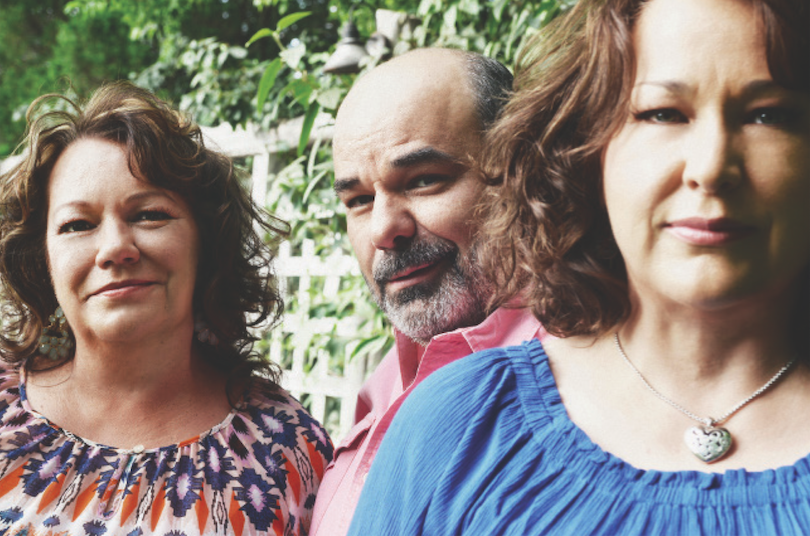
They’re the Loch Ness Monsters of the record world, those great “lost” projects—the Beach Boys’ Smile, Prince’s Black Album, Mick Jagger’s blues collaboration with the Red Devils. After years of anticipation, the hype often outweighs the music. But roots fans sighed in relief in late 2015, when, after a harrowing 17-year odyssey, the Cox Family finally released Gone Like the Cotton, a project that lives up to its legend. The story behind the project involves more than just a collection of songs. There are also the ups and downs of the Cox Family as well as the whims and follies of large record labels.
The patriarch of the group, Willard Cox, was a fixture in North Louisiana bluegrass and country long before the Cox Family formed. The singer and fiddler shared his passion with his four kids, forming a family band with elder daughters Lynn and Evelyn in 1971; Sidney and Suzanne joined as soon as they were old enough. Their music caught the ears of Alison Krauss, who tracked them down at a Texas bluegrass festival after hearing a lo-fi cassette. “I played that over and over,” she said, “and when I met the Cox Family, it was an immediate connection. It was life-changing.”

Krauss introduced the Cox Family to her label, Rounder, producing and guesting on their 1993 debut, Everybody’s Reaching out for Someone. For a “new” band, it was a stunning introduction—confident, assured, fully-formed. By then Sidney Cox was already an accomplished songwriter (Krauss has cut several of his songs, including “I’ve Got That Old Feeling”). Everyone took turns at lead vocals, but it was the siblings’ shimmering, DNA-deep harmonies that were the Cox Family’s signature, a sound at once elegant and downhome. They immediately shot to the top in the bluegrass world, headlining the biggest festivals, building on that with their Grammy-winning gospel set, and completing their Rounder trilogy with 1995’s Beyond the City. Krauss knew audiences would embrace them as she had. “Once they were heard, it really went crazy for them,” Krauss said. “They went on tour with Counting Crows. Things happened pretty quickly, and then they got signed to Asylum.”
That moved occurred during the height of the Garth Ages, when country was America’s biggest music. “There was a lot of money in country music, so people took chances,” Krauss said. Asylum Records head Kyle Lehning signed the group to his Nashville-based Warner subsidiary, a pioneering Americana label home to Guy Clark, Mandy Barnett, and the Trio (Emmylou Harris, Dolly Parton, and Linda Ronstadt). Under Lehning’s leadership, Asylum was that rarest bird in the major-label flock, creating enduring art rather than cranking out radio hits.
The Cox Family’s 1996 Asylum debut proved they belonged on a major label. Just When We’re Thinking It’s Over was a seamless mix of country, bluegrass, and pop produced by Krauss. Recording sessions for the follow-up—the album that would eventually become Gone Like the Cotton—began in late 1997 with Willard, Evelyn, Suzanne, and Sidney (Lynn left in 1995 to spend more time at home). With Alison Krauss as producer, the sessions included Country Music Hall of Fame pianist Pig Robbins and versatile guitarist and longtime Chet Atkins bandmember Pat Bergeson. From Alison Krauss & Union Station came Ron Block, Barry Bales, and Dan Tyminski; other musicians included virtuoso bassist Viktor Krauss, mandolin legend Sam Bush, and Louisiana slide guitar master Sonny Landreth. Instrumental tracks were recorded for 11 songs, along with lead vocals by Willard and Evelyn. When the Cox Family left Nashville’s Emerald Studio in February, 1998, they expected to return in a few weeks for finishing touches on a very hot album.
But as philosopher Mike Tyson once said, “Everyone has a plan until they get punched in the mouth.” With the end of the 90s, country’s bubble burst. Asylum went through major changes. Kyle Lehning departed, the Cox Family was dropped. As more time passed, more events seemed to conspire against the release of the album. In 2000 Willard and his wife Marie were driving near their home in Cotton Valley when they were rear-ended by a logging truck. Willard, his spine crushed, was paralyzed from the waist down. The kids dropped everything to care for their parents. Their mom recovered, but she was already fighting breast cancer. The other members of the Cox Family stayed home and, as Sidney put it, “Everyone went back to civilian-type life.” They all raised families. Mostly they performed locally, in church and at the cemetery. “You talk about wedding singers, we were the funeral singers,” Sidney said. “We buried about 200 people back there.”
Years passed, but no one forgot that lost album, including Kyle Lehning. In late 2000, Asylum was absorbed by Warner Brothers. “From that point on,” Lehning said, “I tried to convince whoever was running Warner Brothers that there was a really good record in their vault that deserved to get finished.” The third label head Lehning tried was John Esposito, who was so impressed by the first Cox Family LP on Asylum that he put his support behind Gone Like the Cotton without even hearing it. Everything connected with the album was collected, including instrumental tracks, vocal “safeties,” and Suzanne’s meticulous session notes. In April, 2015, the Cox Family finally returned to the studio to record the rest of the vocals and Sidney’s guitar and dobro parts. They were finishing the album, not just for themselves, but for Willard, who’s now in assisted living, and Marie, who’d died from cancer in 2009 and to whom it’s dedicated. This is a record the Cox Family simply needed to make, completing their long-delayed mission. “They do it just because,” Krauss said. “That’s how they’re made. They can’t do it any other way. It’s a beautiful thing.”
Like a first date, the Cox Family’s Asylum debut was an album on its best behavior. On Gone Like the Cotton things are more real and edgier. All three of the younger Coxes’ voices are better than they were 20 years ago. But it’s not just richness of tone. After almost 20 more years of living, their parents’ tragic accident, being parents themselves, and perhaps most of all, the frustration of waiting nearly two decades to complete this project, Suzanne, Evelyn, and Sidney brought all those feelings to the microphone. Suzanne opens Gone Like the Cotton with “Good Imitation of the Blues,” a triumphant slow-burn of a breakup song. Evelyn follows with the other side of the story, bringing a palpable sense of heartbreak to David Gates’ “Lost Without Your Love,” her ethereal voice floating over a bed of strings. Sidney’s solo, “In My Eyes,” is a pop song co-written by Kostas, given Beatle-esque grace by Landreth’s George Harrison-inflected slide.
For an album characterized by misfortunes, there was one stroke of luck: all three of Willard’s lead vocals were completed before the accident. Uncompromising country and bluegrass, the performances of Crystal Gayle’s “I’ll Get Over You,” the Louvin Brothers’ “Cash on the Barrelhead,” and the Lonesome Pine Fiddlers’ “Honky Tonk Blues” are classic Willard.
The one new song is the title track, written by Sidney and Suzanne in tribute to their parents, grandparents, and Cotton Valley. It’s a sparse coda, with only Sidney’s rhythm guitar underpinning Suzanne’s soulful voice, and that heart-breaking, born-in-the-blood trio on the choruses. “Gone Like the Cotton” is the most literally biographical song, but the entire album tells the Cox Family story.

Gone Like the Cotton features four lead singers and multiple styles and genres, but the glue holding the record together is that Cox Family harmony, smooth, intuitive, and other-worldly. The love that Krauss expresses for the Coxes went into her production work, and with Paczoza’s stellar engineering, the sound is clear, warm, and intimate, with no dated 90s production tricks.
“This is the pinnacle of all that we could give out of our hearts for the music that we loved and cherished,” Sidney said of the album. “It’s all of the things that we were influenced by, whether it be the geographical place, or all the music that we played, or the way of life that we lived.
“That music still represents the people that we are. We have survived together. And that music is about us being together, and remaining together for 17 years. And even though we weren’t playing, we were always together, in the common hope that we would be able to finish this story. And I’m so glad that we did.”
You will be too. In a world of disposable music, Gone Like the Cotton is here to stay.






















